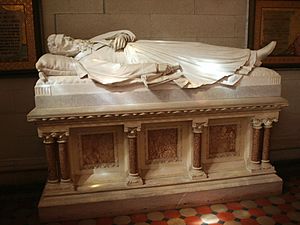Ezra Cornell facts for kids
Quick facts for kids
Ezra Cornell
|
|
|---|---|
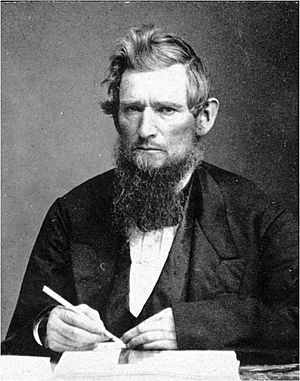 |
|
| 1st Chairman of Cornell Board of Trustees | |
| In office 1866–1874 |
|
| Succeeded by | Henry W. Sage |
| Member of the New York Senate from the 24th district |
|
| In office January 1, 1864 – December 31, 1867 |
|
| Preceded by | Lyman Truman |
| Succeeded by | Orlow W. Chapman |
| Member of the New York State Assembly from the Tompkins County district |
|
| In office January 1, 1862 – December 31, 1863 |
|
| Preceded by | Jeremiah W. Dwight |
| Succeeded by | Henry B. Lord |
| Personal details | |
| Born | January 11, 1807 Westchester Landing, The Bronx, New York, U.S. |
| Died | December 9, 1874 (aged 67) Ithaca, New York, U.S. |
| Political party | Republican |
| Signature | |
Ezra Cornell (January 11, 1807 – December 9, 1874) was a smart American businessman, a politician, and someone who loved to help others. He started the famous company Western Union. He also helped create Cornell University, a well-known school. Besides that, he was the head of the New York Agriculture Society and served as a New York State Senator.
Contents
Ezra Cornell's Early Life
Ezra Cornell was born on January 11, 1807, in a place called Westchester Landing, which is now part of The Bronx in New York City. His father, Elijah Cornell, was a potter. Ezra grew up near DeRuyter, New York. He was related to Paul Cornell, who founded the Hyde Park area in Chicago. His family had been in America for a long time, with his earliest ancestor, Thomas Cornell, arriving in the 1600s.
Starting His Career
Ezra Cornell first worked as a carpenter. He traveled a lot around New York state for his job. In 1828, he saw Cayuga Lake and Ithaca, New York for the first time. He liked it so much that he decided to make Ithaca his home.
He was hired to fix machines at a cotton mill. Later, he worked on plaster and flour mills. Ezra was very good at designing and building things. He even built a stone dam that created Beebe Lake. By 1832, he was in charge of all the mill operations.
In 1831, Ezra married Mary Ann Wood. To earn more money for his growing family, he bought the rights to sell a new type of plow. He traveled to states like Maine and Georgia to sell these plows.
The Telegraph Business
In 1842, Ezra Cornell learned about the telegraph. This new invention sent messages over long distances using electricity. Samuel Morse held the patent for the telegraph. Ezra met F.O.J. Smith, who was trying to bury telegraph wires underground.
Ezra came up with a special plow that could dig a ditch, lay the wire and pipe, and then cover it up. However, they soon found that burying the wires didn't work well. The wires needed to be hung from poles instead.
Ezra made his fortune in the telegraph business. He worked with Samuel Morse to build the first major telegraph line in the U.S., connecting Baltimore and Washington. He also invented glass insulators. These small glass pieces kept the telegraph wires from losing their electrical signal when they touched the poles.
He helped build many telegraph lines across the country. Eventually, his company, Erie and Michigan line, joined with another company to form Western Union. Ezra Cornell received a lot of money in Western Union stock, making him very wealthy.
Serving in Politics
Ezra Cornell was a member of the Republican Party. He served in the New York State Assembly for Tompkins County from 1862 to 1863. After that, he was a member of the New York State Senate from 1864 to 1867.
Starting a Public Library
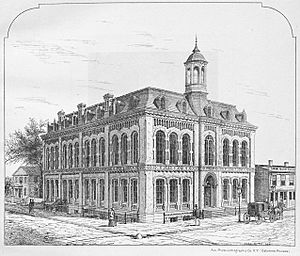
After becoming wealthy, Ezra Cornell focused on helping his community. He gave money to start the Cornell Free Library in Ithaca. This was the first public library for the people of the town. The library opened in 1866. The original building was later replaced, but the library continued to grow and now serves the entire county as the Tompkins County Public Library.
In 2016, a mural of Ezra Cornell was put on the outside wall of the current library. This was to celebrate 150 years since he gave his gift.
Founding Cornell University
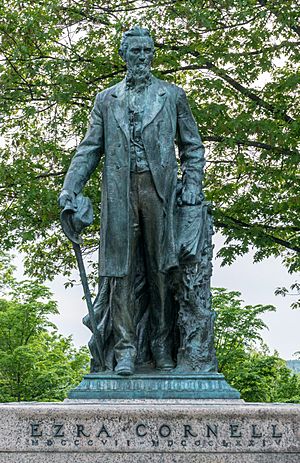
Ezra Cornell loved science and farming. He saw a great chance with the 1862 Morrill Land-Grant Acts. This law allowed states to create colleges that taught practical subjects like agriculture and engineering, not just traditional subjects.
He worked with Andrew Dickson White to make his dream a reality. Together, they helped establish Cornell University in 1865. It became New York's land-grant university.
Cornell University became very successful financially, much more than other land-grant colleges. Ezra Cornell was smart about how he managed the land given to the university. He held onto most of the land rights, waiting for their value to go up. He also invested in valuable timber land. Because of his smart decisions, the university earned a lot of money. The town of Cornell, Wisconsin is even named after him because of these timber holdings.
Railroad and Letters
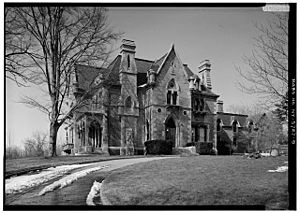
Ezra Cornell also got into the railroad business. However, he faced difficulties during a financial crisis in 1873. He started building a large mansion in Ithaca called Llenroc. The name "Llenroc" is "Cornell" spelled backward! Sadly, he passed away before it was finished. Today, Llenroc is a fraternity house at Cornell University.
Ezra was known for writing many letters. He wrote dozens of letters every week to his business partners and friends. This was partly because he traveled so much and had many connections. Today, you can even find about 30,000 of his letters online at Cornell University.
Personal Life
Ezra Cornell was born into a Quaker family. However, he was later no longer considered a Quaker because he married Mary Ann Wood, who was a Methodist.
Ezra Cornell is buried in Sage Chapel on the Cornell campus. His eldest son, Alonzo B. Cornell, later became the governor of New York. A special rule at Cornell University states that the oldest direct descendant of Ezra Cornell gets a lifelong seat on the university's Board of Trustees.
In 1990, G. David Low, an astronaut and Cornell University graduate, took a special item into space. He brought a pair of tan silk socks that Ezra Cornell wore on his wedding day in 1831!
See also
 In Spanish: Ezra Cornell para niños
In Spanish: Ezra Cornell para niños
- Henry Wells
- Mary Morrill Foulger
- Peter Foulger
- Cornell, Ontario
- William Wesley Cornell
 | William M. Jackson |
 | Juan E. Gilbert |
 | Neil deGrasse Tyson |


